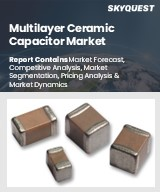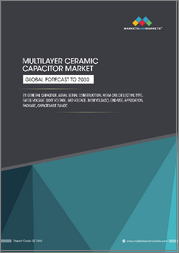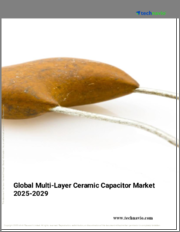
|
시장보고서
상품코드
1800859
적층 세라믹 커패시터 시장 보고서 : 유형별, 전압 범위별, 유전체 유형별, 최종 용도별, 지역별(2025-2033년)Multi-Layer Ceramic Capacitor Market Report by Type, Voltage Range (Low Range, Medium Range, High Range ), Dielectric Type, End Use, and Region 2025-2033 |
||||||
세계 적층 세라믹 커패시터 시장 규모는 2024년 114억 달러에 달했습니다. 향후 IMARC Group은 2033년에는 177억 달러에 달할 것으로 예상하며, 2025-2033년 연평균 성장률(CAGR)은 4.81%에 달할 것으로 전망하고 있습니다.
적층 세라믹 커패시터(MLCC)는 두 개 이상의 세라믹 층이 교대로 유전체 역할을 하는 고정값 커패시터를 말합니다. 병렬로 배치된 개별 커패시터를 모놀리식 구조로 연결하여 기존 알루미늄 전해 커패시터에 비해 높은 주파수를 실현하였습니다. 그 결과 자동차, 전자, 통신, 데이터 전송, 발전 등 다양한 분야에서 널리 사용되고 있습니다.
에너지 수요의 증가는 주로 주거 및 상업 시설에서 무정전 전력 공급을 보장하기 위해 MLCC의 채택을 촉진하고 있습니다. 또한, 재생에너지 분야의 확대는 외부 충격으로부터 전기 부품을 보호하는 세라믹 기반 커패시터에 대한 수요를 촉진하고 있습니다. 스마트폰, 디지털 TV, 멀티미디어 플레이어 등의 수요 증가에 따른 가전 산업의 괄목할만한 성장도 시장 성장을 견인하고 있습니다. 또한, IoT, AI, 원격 감지 등 수많은 첨단 기술과 다양한 스마트 웨어러블 및 센서 기반 디바이스의 커패시터와의 통합이 진행되고 있는 것도 세계 시장을 활성화시키고 있습니다. 이에 따라 스마트 인프라의 증가는 사람의 개입 없이 유선 또는 무선 네트워크에서 데이터 전송을 용이하게 하는 MLCC의 채택을 더욱 촉진하고 있습니다. 또한, 자동차 분야의 확대와 자율주행차 및 무인자동차의 등장도 시장 성장을 견인하고 있습니다. 이와 더불어, 전송 능력을 향상시킨 첨단 제품 개발에 주력하는 제조업체들이 늘어나고 있는 점도 향후 몇 년 동안 MLCC 세계 시장을 더욱 견인할 것으로 보입니다.
본 보고서에서 다루는 주요 질문
- 적층 세라믹 커패시터 세계 시장은 지금까지 어떻게 성장해 왔을까?
- COVID-19가 적층 세라믹 커패시터 세계 시장에 미치는 영향은?
- 주요 지역 시장이란?
- 유형별 시장 분석은?
- 전압 범위별 시장 분석은?
- 유전체 유형별 시장 분석은?
- 최종 용도별 시장 분석은?
- 산업 가치사슬의 다양한 단계는 무엇인가?
- 시장의 주요 촉진요인과 과제는 무엇인가?
- 세계 적층 세라믹 커패시터 시장의 구조와 주요 업체는?
- 시장에서의 경쟁은 어느 정도인가?
목차
제1장 서문
제2장 조사 범위와 조사 방법
- 조사 목적
- 이해관계자
- 데이터 소스
- 1차 정보
- 2차 정보
- 시장 추정
- 상향식 접근
- 하향식 접근
- 조사 방법
제3장 주요 요약
제4장 소개
제5장 세계의 적층 세라믹 커패시터 시장
- 시장 개요
- 시장 실적
- COVID-19의 영향
- 시장 예측
제6장 시장 내역 : 유형별
- 일반적인 콘덴서
- 배열
- 시리얼 구축
- 메가 캡
- 기타
제7장 시장 내역 : 전압 범위별
- 저전압(50V 미만)
- 중전압(50 V-600 V)
- 고전압(600V 이상)
제8장 시장 내역 : 유전체 유형별
- X7R
- X5R
- C0G
- Y5V
- 기타
제9장 시장 내역 : 최종 용도별
- 소비자
- 자동차
- 통신
- 데이터 전송
- 기타
제10장 시장 내역 : 지역별
- 북미
- 미국
- 캐나다
- 아시아태평양
- 중국
- 일본
- 인도
- 한국
- 호주
- 인도네시아
- 기타
- 유럽
- 독일
- 프랑스
- 영국
- 이탈리아
- 스페인
- 러시아
- 기타
- 라틴아메리카
- 브라질
- 멕시코
- 기타
- 중동 및 아프리카
제11장 SWOT 분석
제12장 밸류체인 분석
제13장 Porter's Five Forces 분석
제14장 경쟁 구도
- 시장 구조
- 주요 기업
- 주요 기업 개요
- Darfon Electronics Corporation
- Kyocera Corporation
- Murata Manufacturing Co. Ltd.
- Samsung Electro-Mechanics Co. Ltd.(Samsung Group)
- Taiyo Yuden Co. Ltd.
- TDK Corporation
- Vishay Intertechnology Inc.
- Walsin Technology Corporation
- Yageo Corporation
The global multi-layer ceramic capacitor market size reached USD 11.4 Billion in 2024. Looking forward, IMARC Group expects the market to reach USD 17.7 Billion by 2033, exhibiting a growth rate (CAGR) of 4.81% during 2025-2033.
Multi-layer ceramic capacitor (MLCC) refers to a fixed-value capacitor where two or more alternating layers of ceramic act as the dielectric. It comprises of parallelly-arranged individual capacitors that are connected to a monolithic structure, thereby offering higher frequency in comparison to the conventional aluminum electrolytic capacitors. As a result, it is widely installed across diverse sectors, such as, automotive, electronics, telecommunication, data transmission, power generation, etc.
The growing energy demand is primarily driving the adoption of MLCC for ensuring uninterrupted power supply across the residential and commercial complexes. Moreover, the expanding renewable energy sector is also propelling the demand for ceramic-based capacitors for protecting electrical components from external impacts. A significant growth in the consumer electronics industry along with the increasing demand for smartphones, digital TV sets, multimedia players, etc., is also augmenting the market growth. Furthermore, the rising integration of numerous advanced technologies, such as IoT, AI, remote sensing, etc., with capacitors in various smart wearables and sensor-based devices is also catalyzing the global market. In line with this, the growing number of smart infrastructures is further bolstering the adoption of MLCC to facilitate data transfer over a wired or wireless network without human intervention. Moreover, the expanding automotive sector coupled with the emergence of autonomous and driverless vehicles is also propelling the market growth. Besides this, the increasing focus of several manufacturers on the development of advanced product variants with improved transmission capacities will continue to further drive the global market for MLCC in the coming years.
Key Market Segmentation:
Breakup by Type:
- General Capacitor
- Array
- Serial Construction
- Mega Cap
- Others
Breakup by Voltage Range:
- Low Range (Less Than 50V)
- Medium Range (50V to 600V)
- High Range (Above 600V)
Breakup by Dielectric Type:
- X7R
- X5R
- C0G
- Y5V
- Others
Breakup by End Use:
- Consumer Electronics
- Automotive
- Telecommunication
- Data Transmission
- Others
Breakup by Region:
- North America
- United States
- Canada
- Asia Pacific
- China
- Japan
- India
- South Korea
- Australia
- Indonesia
- Others
- Europe
- Germany
- France
- United Kingdom
- Italy
- Spain
- Russia
- Others
- Latin America
- Brazil
- Mexico
- Others
- Middle East and Africa
Competitive Landscape:
The competitive landscape of the industry has also been examined with some of the key players being Darfon Electronics Corporation, Kyocera Corporation, Murata Manufacturing Co. Ltd., Samsung Electro-Mechanics Co. Ltd. (Samsung Group), Taiyo Yuden Co. Ltd., TDK Corporation, Vishay Intertechnology Inc., Walsin Technology Corporation and Yageo Corporation.
Key Questions Answered in This Report:
- How has the global multi-layer ceramic capacitor market performed so far and how will it perform in the coming years?
- What is the impact of COVID-19 on global multi-layer ceramic capacitor market?
- What are the key regional markets?
- What is the breakup of the market based on the type?
- What is the breakup of the market based on the voltage range?
- What is the breakup of the market based on the dielectric type?
- What is the breakup of the market based on the end use?
- What are the various stages in the value chain of the industry?
- What are the key driving factors and challenges in the market?
- What is the structure of the global multi-layer ceramic capacitor market and who are the key players?
- What is the degree of competition in the market?
Table of Contents
1 Preface
2 Scope and Methodology
- 2.1 Objectives of the Study
- 2.2 Stakeholders
- 2.3 Data Sources
- 2.3.1 Primary Sources
- 2.3.2 Secondary Sources
- 2.4 Market Estimation
- 2.4.1 Bottom-Up Approach
- 2.4.2 Top-Down Approach
- 2.5 Forecasting Methodology
3 Executive Summary
4 Introduction
- 4.1 Overview
- 4.2 Key Industry Trends
5 Global Multi-Layer Ceramic Capacitor Market
- 5.1 Market Overview
- 5.2 Market Performance
- 5.3 Impact of COVID-19
- 5.4 Market Forecast
6 Market Breakup by Type
- 6.1 General Capacitor
- 6.1.1 Market Trends
- 6.1.2 Market Forecast
- 6.2 Array
- 6.2.1 Market Trends
- 6.2.2 Market Forecast
- 6.3 Serial Construction
- 6.3.1 Market Trends
- 6.3.2 Market Forecast
- 6.4 Mega Cap
- 6.4.1 Market Trends
- 6.4.2 Market Forecast
- 6.5 Others
- 6.5.1 Market Trends
- 6.5.2 Market Forecast
7 Market Breakup by Voltage Range
- 7.1 Low Range (Less Than 50V)
- 7.1.1 Market Trends
- 7.1.2 Market Forecast
- 7.2 Medium Range (50V to 600V)
- 7.2.1 Market Trends
- 7.2.2 Market Forecast
- 7.3 High Range (Above 600V)
- 7.3.1 Market Trends
- 7.3.2 Market Forecast
8 Market Breakup by Dielectric Type
- 8.1 X7R
- 8.1.1 Market Trends
- 8.1.2 Market Forecast
- 8.2 X5R
- 8.2.1 Market Trends
- 8.2.2 Market Forecast
- 8.3 C0G
- 8.3.1 Market Trends
- 8.3.2 Market Forecast
- 8.4 Y5V
- 8.4.1 Market Trends
- 8.4.2 Market Forecast
- 8.5 Others
- 8.5.1 Market Trends
- 8.5.2 Market Forecast
9 Market Breakup by End Use
- 9.1 Consumer Electronics
- 9.1.1 Market Trends
- 9.1.2 Market Forecast
- 9.2 Automotive
- 9.2.1 Market Trends
- 9.2.2 Market Forecast
- 9.3 Telecommunication
- 9.3.1 Market Trends
- 9.3.2 Market Forecast
- 9.4 Data Transmission
- 9.4.1 Market Trends
- 9.4.2 Market Forecast
- 9.5 Others
- 9.5.1 Market Trends
- 9.5.2 Market Forecast
10 Market Breakup by Region
- 10.1 North America
- 10.1.1 United States
- 10.1.1.1 Market Trends
- 10.1.1.2 Market Forecast
- 10.1.2 Canada
- 10.1.2.1 Market Trends
- 10.1.2.2 Market Forecast
- 10.1.1 United States
- 10.2 Asia Pacific
- 10.2.1 China
- 10.2.1.1 Market Trends
- 10.2.1.2 Market Forecast
- 10.2.2 Japan
- 10.2.2.1 Market Trends
- 10.2.2.2 Market Forecast
- 10.2.3 India
- 10.2.3.1 Market Trends
- 10.2.3.2 Market Forecast
- 10.2.4 South Korea
- 10.2.4.1 Market Trends
- 10.2.4.2 Market Forecast
- 10.2.5 Australia
- 10.2.5.1 Market Trends
- 10.2.5.2 Market Forecast
- 10.2.6 Indonesia
- 10.2.6.1 Market Trends
- 10.2.6.2 Market Forecast
- 10.2.7 Others
- 10.2.7.1 Market Trends
- 10.2.7.2 Market Forecast
- 10.2.1 China
- 10.3 Europe
- 10.3.1 Germany
- 10.3.1.1 Market Trends
- 10.3.1.2 Market Forecast
- 10.3.2 France
- 10.3.2.1 Market Trends
- 10.3.2.2 Market Forecast
- 10.3.3 United Kingdom
- 10.3.3.1 Market Trends
- 10.3.3.2 Market Forecast
- 10.3.4 Italy
- 10.3.4.1 Market Trends
- 10.3.4.2 Market Forecast
- 10.3.5 Spain
- 10.3.5.1 Market Trends
- 10.3.5.2 Market Forecast
- 10.3.6 Russia
- 10.3.6.1 Market Trends
- 10.3.6.2 Market Forecast
- 10.3.7 Others
- 10.3.7.1 Market Trends
- 10.3.7.2 Market Forecast
- 10.3.1 Germany
- 10.4 Latin America
- 10.4.1 Brazil
- 10.4.1.1 Market Trends
- 10.4.1.2 Market Forecast
- 10.4.2 Mexico
- 10.4.2.1 Market Trends
- 10.4.2.2 Market Forecast
- 10.4.3 Others
- 10.4.3.1 Market Trends
- 10.4.3.2 Market Forecast
- 10.4.1 Brazil
- 10.5 Middle East and Africa
- 10.5.1 Market Trends
- 10.5.2 Market Breakup by Country
- 10.5.3 Market Forecast
11 SWOT Analysis
- 11.1 Overview
- 11.2 Strengths
- 11.3 Weaknesses
- 11.4 Opportunities
- 11.5 Threats
12 Value Chain Analysis
13 Porters Five Forces Analysis
- 13.1 Overview
- 13.2 Bargaining Power of Buyers
- 13.3 Bargaining Power of Suppliers
- 13.4 Degree of Competition
- 13.5 Threat of New Entrants
- 13.6 Threat of Substitutes
14 Competitive Landscape
- 14.1 Market Structure
- 14.2 Key Players
- 14.3 Profiles of Key Players
- 14.3.1 Darfon Electronics Corporation
- 14.3.1.1 Company Overview
- 14.3.1.2 Product Portfolio
- 14.3.1.3 Financials
- 14.3.2 Kyocera Corporation
- 14.3.2.1 Company Overview
- 14.3.2.2 Product Portfolio
- 14.3.2.3 Financials
- 14.3.2.4 SWOT Analysis
- 14.3.3 Murata Manufacturing Co. Ltd.
- 14.3.3.1 Company Overview
- 14.3.3.2 Product Portfolio
- 14.3.3.3 Financials
- 14.3.3.4 SWOT Analysis
- 14.3.4 Samsung Electro-Mechanics Co. Ltd. (Samsung Group)
- 14.3.4.1 Company Overview
- 14.3.4.2 Product Portfolio
- 14.3.4.3 Financials
- 14.3.4.4 SWOT Analysis
- 14.3.5 Taiyo Yuden Co. Ltd.
- 14.3.5.1 Company Overview
- 14.3.5.2 Product Portfolio
- 14.3.5.3 Financials
- 14.3.6 TDK Corporation
- 14.3.6.1 Company Overview
- 14.3.6.2 Product Portfolio
- 14.3.6.3 Financials
- 14.3.6.4 SWOT Analysis
- 14.3.7 Vishay Intertechnology Inc.
- 14.3.7.1 Company Overview
- 14.3.7.2 Product Portfolio
- 14.3.7.3 Financials
- 14.3.7.4 SWOT Analysis
- 14.3.8 Walsin Technology Corporation
- 14.3.8.1 Company Overview
- 14.3.8.2 Product Portfolio
- 14.3.8.3 Financials
- 14.3.9 Yageo Corporation
- 14.3.9.1 Company Overview
- 14.3.9.2 Product Portfolio
- 14.3.9.3 Financials
- 14.3.1 Darfon Electronics Corporation



















